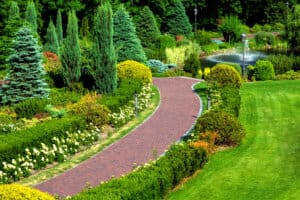There’s nothing like sitting on your back deck and enjoying the sounds of rustling trees or watching them change with the seasons. Enhancing the aesthetic appeal of your yard while promoting the health of your trees can be achieved through skillful landscaping around them. However, it is crucial to avoid common errors when using hardscapes near trees. Here are some of the biggest mistakes we see people make around trees in landscaping.
 What Not-to-do When Using Hardscapes Near Trees in Your Landscaping:
What Not-to-do When Using Hardscapes Near Trees in Your Landscaping:
Creating a raised border
One common oversight made by homeowners is the establishment of a raised border encircling a tree, subsequently filling it with soil to create a planting bed. This practice can result in the soil level rising above the tree’s root flare, leading to undesirable consequences such as root rot and other issues. To avoid such problems, leave the root flare exposed and refrain from elevating the soil level at the base of the tree.
Excessive mulching
Improper mulching, particularly when applied in excessive quantities around plants, can cause harm. In the case of trees and woody shrubs, excessive mulch accumulation retains excessive moisture and encourages bark decay. It is important to apply mulch up to the edge of the tree’s canopy, known as the drip line, and maintain a six-inch distance between the mulch and the tree’s trunk.
Applying an excessive amount of mulch can smother the tree and cause the root system to develop too close to the soil surface in search of oxygen, potentially leading to girdling. It is advisable to limit the depth of mulch to 2-4 inches and refrain from piling it against the trunk of the tree.
Planting in close proximity
Planting trees and other plants too closely together can induce competition for resources, leading to stunted growth or even death. To ensure optimal growth and vitality, it is essential to provide adequate space for trees and plants to flourish.
Neglecting light requirements
Disregarding the light requirements of plants can result in suboptimal growth or even mortality. It is crucial to select plants that are well-suited to the available light conditions in the designated planting area.
Failure to consider plant height
Overlooking the height of plants during the selection process can result in overcrowding and inadequate space for growth. It is vital to choose plants that are proportionate to the available space and allocate sufficient room for their expansion.
Concealing the tree’s roots
Avoid covering the roots of trees with hardscaping materials, as this will impede their access to water and nutrients, compromising growth and potentially leading to tree decline or death. Take into consideration that the tree’s roots will grow significantly as the tree ages.
Walkways too close to trees
It is crucial to limit foot, vehicle, or machinery traffic in areas where tree roots are exposed. Give adequate space between trees and walkways, driveways, and patio areas. The pressure can cause damage to the roots and hinder the tree’s ability to access essential water and nutrients.
Hilton Landscape Supply can help you with all your landscaping needs.
Incorporating hardscape elements around trees offers an excellent opportunity to augment the visual appeal of your yard while ensuring the trees’ well-being. Nonetheless, it’s important to avoid common errors such as creating raised borders, excessive mulching, close planting, disregarding light requirements, neglecting plant height, covering roots, mulching excessively, and allowing traffic near exposed roots. By adhering to these recommendations for hardscapes near trees, you can establish a solid foundation for your trees and design functional and aesthetically pleasing hardscape solutions.
For landscaping advice and quality materials, come visit us at Hilton Landscape Supply. We provide an extensive range of resources necessary for creating a beautiful and thriving landscape, including soils, mulch, and stone. With our expertise and assistance, it’s easy to design and build a landscape that will bring you joy for years to come.

 What Not-to-do When Using Hardscapes Near Trees in Your Landscaping:
What Not-to-do When Using Hardscapes Near Trees in Your Landscaping: